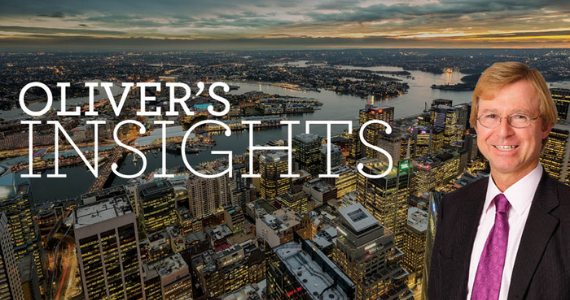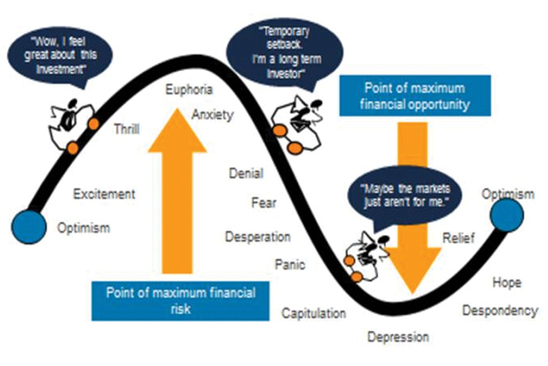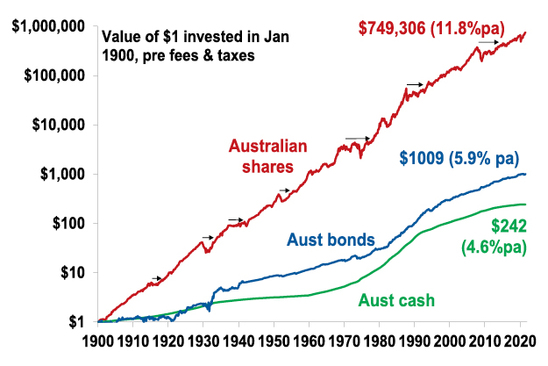Dr Shane Oliver – Head of Investment Strategy and Chief Economist, AMP Capital

Introduction
The current environment seems to be one of extreme uncertainty. We have seen a strong economic recovery from last year’s global and Australian recessions – but there are worries about the resurgence of coronavirus driven by the Delta variant, peak growth, peak monetary and fiscal stimulus, high inflation, and high debt levels. And ‘get rich quick’ trading around crypto currencies and “meme” stocks like GameStop on the back of the Reddit/WallStreetBets forum phenomenon have seen some question traditional approaches to investing. In the meantime, investors are getting bombarded with more information and views around investing than ever.
Despite this, the basic principles of investing remain timeless. Any investible asset must ultimately provide a fundamental economic return – usually in the form of earnings, interest or rent – to be justified and sustained. And we have seen it all before, whether it’s cycles or optimism about some new technology or new way of trading, only to see the basic principles of investing continue to assert themselves. Fortunately, some investment experts have a knack of encapsulating this in a few words that are insightful and inspiring. Over the years, I have compiled various insights highlighting such quotes. This one looks at those of particular relevance to the environment investors face today.
Investing
“The four most dangerous words in investing are: ‘this time it’s different’.” – John Templeton
This is a good one because I hear versions of “this time it’s different” over and over. History tells us that that there are good times and bad and assuming that either will persist indefinitely is a big mistake. Whenever you hear talk of “new paradigms”, “new eras” or “new normals” it’s usually getting time for the cycle to go in the other direction. But the same applies to claims that there is a new way to invest and make millions. Maybe if you get in early and it then sucks in the crowd you could do well. But that’s more luck.
“Investing should be like watching paint dry or watching grass grow. If you want excitement…go to Las Vegas.” – Paul Samuelson
Investing is not the same as gambling or gaming and, while it should be rewarding and enjoyable, it’s not really entertainment. It requires a much longer time frame to payoff consistently.
“There is no free lunch.” – Anon
If an investment looks too good to be true or sustained in terms of return or risk, it probably is. Rather, focus on investments offering sustainable cash flows (dividends, rents, interest) that don’t rely on excessive gearing or financial engineering.
“Never invest in a business you can’t understand.” – Warren Buffett
Many lost a fortune through the GFC in investments that were not easy to understand and involved excessive complexity. While there’s likely something in blockchain and digital finance, the same caution applies to crypto currencies.
“That men and women do not learn very much from the lessons of history is the most important of all the lessons of history.” – Aldous Huxley
This is partly why investment cycles and shonky ‘get rich quick’ investment schemes perpetuate, no matter how much regulators try to prevent behaviour which gives rise to them. The key for investors is to have an historical perspective – partly so they can filter the noise from what matters, but also to help guard against being sucked into periods of euphoria or pessimism regarding a market, investment or approach to investing.
The cycle
“Bull markets are born on pessimism, grow on scepticism, mature on optimism and die of euphoria.” – John Templeton
This is perhaps one of the best characterisations of how an investment cycle unfolds. It follows that the point of maximum opportunity is around the time most are pessimistic and bearish (as this is often when the market is cheapest) and the point of maximum risk is when all are euphoric (this is often when the market is most expensive), but unfortunately many don’t realise this because it involves going against the crowd. So, in trying to assess whether we are at the bottom or the peak of a cycle it’s worth considering whether we are seeing pessimism and depression for bottoms and euphoria for tops.
The roller coaster of investor emotion

Source: Russell Investments, AMP Capital
“History doesn’t repeat but it rhymes.” – Often attributed to Mark Twain (although it’s unclear he actually said it)
No two cycles are the same. For example, the bear market associated with the GFC had a radically different genesis to the pandemic-driven bear market last year. But each cycle has common elements which make them rhyme. In upswings, investment markets are pushed to the point where the relevant asset has become overvalued, over loved (in that everyone is on board) and over bought and vice versa in downturns.
Recognising these common elements is necessary if you are to get a handle on cyclical swings in investment markets.
Timing corrections
“More money has been lost trying to anticipate and protect from corrections than actually in them.” – Peter Lynch
Preserving capital is important, but this can be taken too far and often is in the aftermath of bad times with the result that investors end up so focused on trying to avoid losses in shares they miss the returns they offer. We have seen a bit of that ever since share markets bottomed in March 2020, with numerous forecasts for steep falls ever since and yet markets have fallen a few percent every so often only to resume their rising trend.
Pessimism (and the pandemic)
“In the old legend the wise men finally boiled down the history of mortal affairs into a single phrase: ‘This too will pass.’” – Benjamin Graham
Just as historical experience tells us there are investment cycles and bad times, it also tells us that they pass. The same applies to pandemics and their economic and investment impact. In the case of coronavirus, there is now strong evidence that humans will bring it under control with science & medicine.
“More than any other time in history, mankind faces a crossroads. One path leads to despair and utter hopelessness. The other to total extinction. Let us pray we have the wisdom to choose.” – Woody Allen
Sometimes it seems that if the virus won’t get us, inflation, high debt levels and geopolitical tensions will. Bad things happen (as we have seen over the last 18 months) but invariably things turn out ok for well diversified investors following sensible strategies.
“To be an investor you must be a believer in a better tomorrow.” – Benjamin Graham
If you don’t believe the bank will look after your term deposits, that most borrowers will pay back their debts, that most companies will see rising profits over time as the economy grows, that properties will earn rents, etc (and that the world will learn to shake off or live relatively safely with coronavirus) then there is no point investing. This is flippant but true – to be a successful investor you need a favourable view of the future.
Growing wealth & long-term investing
“Put time on your side. Start saving early and save regularly. Live modestly and don’t touch the money that’s been set aside.” – Burton G Malkiel
For an investor, time is your friend and the earlier you start the better. This along, with having exposure to growth assets, is the best way to take advantage of the magic of compound interest. Fortunately, the Australian superannuation system is based on just that. The next chart shows the value of $1 invested in various Australian asset classes since 1900 allowing for the reinvestment of any income along the way. That $1 would have grown to $246 if invested in cash, $1009 in bonds but $749,306 if invested in shares. While the average share return is only double that in bonds, the huge gap in the end result owes to the magic of compounding returns on top of returns. A growth asset like property is similar to shares over long periods in this regard. Short-term share returns bounce around and can go through lengthy bear markets (shown with arrows on the chart). But the longer the period you allow to build your savings, the easier it is to look through short-term market fluctuations, and the greater the time the compounding of higher returns from growth assets has to build on itself.
Shares versus bonds & cash over very long term – Australia

Source: ASX, Bloomberg, AMP Capital
“Much success can be attributed to inactivity. Most investors cannot resist the temptation to constantly buy and sell.” – Warren Buffett
Unless you really want to put a lot of time into trading, it’s advisable to only invest in assets you would be comfortable holding for the long term. This is less risky than constantly tinkering in response to predictions of short-term changes in value and all the noise around investment markets.
“Don’t look for the needle in the haystack, just buy the haystack!” – John C Bogle
Trying to beat the market by stock picking can be hard and so if you want to consistently grow wealth the key is to get a broad exposure to the market and let compound interest do its job.
Knowledge, wisdom and noise
“Stock market news has gone from hard to find (in the 1970s and early 1980s), then easy to find (in the late 1980s), then hard to get away from.” – Peter Lynch
Thanks to the internet we now have access to an abundance of information and opinion regarding investment markets. The danger is that it leads to uncertainty around investing resulting in excessive caution, a short-term focus, and a tendency to overreact to news and a focus on things of little relevance.
“Information is not knowledge, knowledge is not wisdom.” – Frank Zappa (and possibly some others)
We need to recognise that much of this information and opinion is ill-informed, and that there is a big difference between information and wisdom when it comes to investing. I am reminded of this particularly in relation to all the non-sensical conspiracy theories we are now being bombarded with regarding coronavirus and the vaccines on social media.
And in the end
“Money is not the most important thing in the world. Love is. Fortunately, I love money.” – Jackie Mason
The Beatles wisely realised that “money can’t buy me love” and “in the end the love you take is equal to the love you make”.
Source: AMP Capital August 2021
Important note: While every care has been taken in the preparation of this document, AMP Capital Investors Limited (ABN 59 001 777 591, AFSL 232497) and AMP Capital Funds Management Limited (ABN 15 159 557 721, AFSL 426455) make no representations or warranties as to the accuracy or completeness of any statement in it including, without limitation, any forecasts. Past performance is not a reliable indicator of future performance. This document has been prepared for the purpose of providing general information, without taking account of any particular investor’s objectives, financial situation or needs. An investor should, before making any investment decisions, consider the appropriateness of the information in this document, and seek professional advice, having regard to the investor’s objectives, financial situation and needs. This document is solely for the use of the party to whom it is provided.



